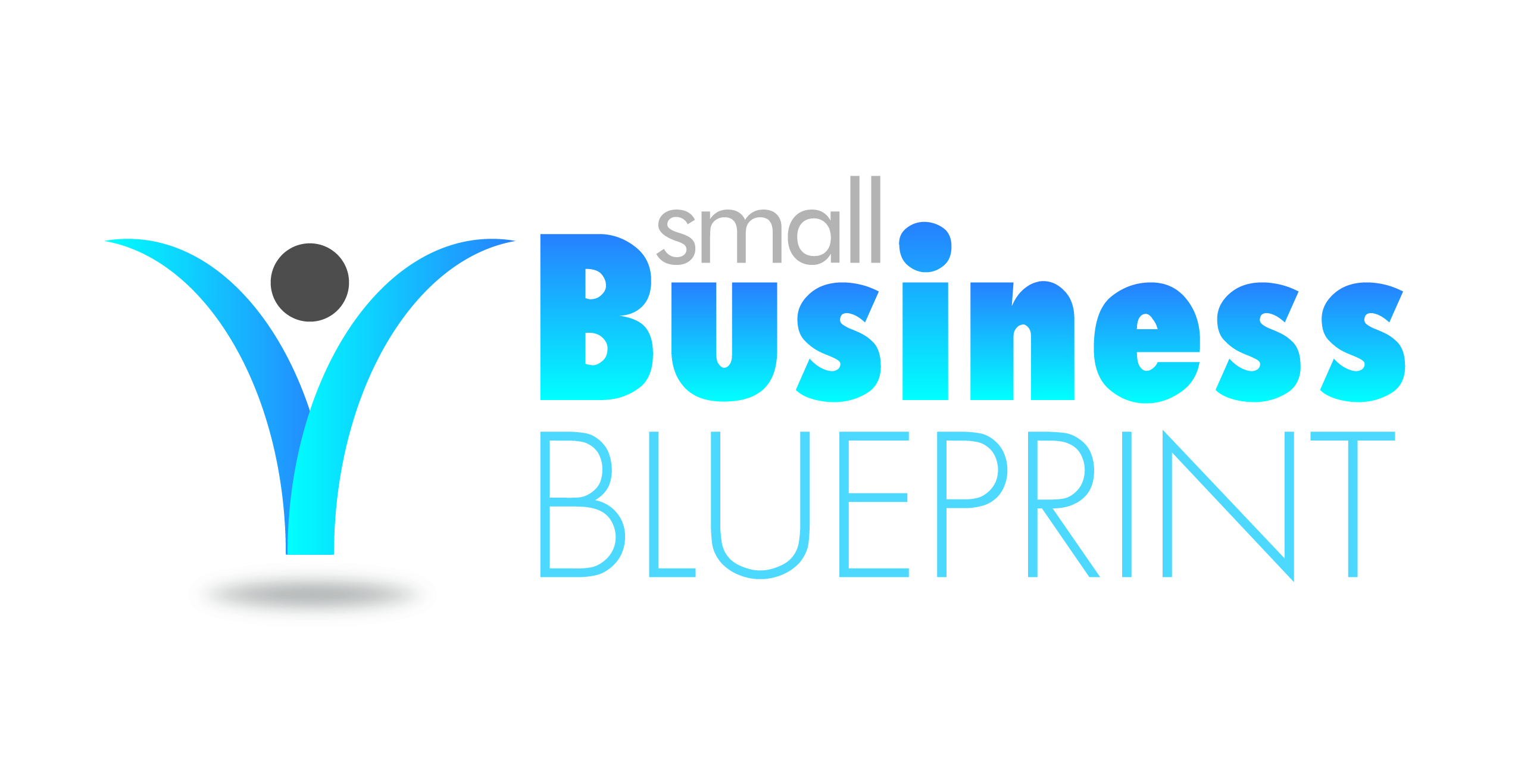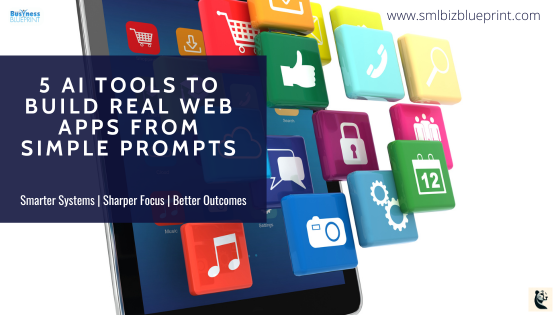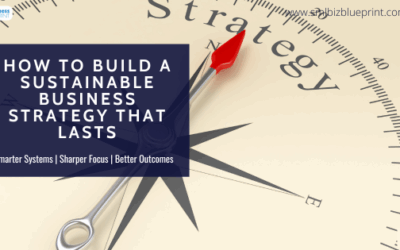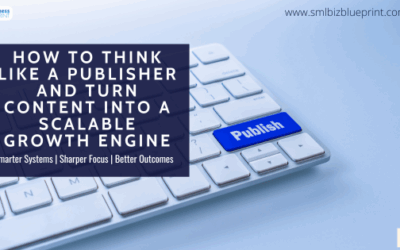Forget basic landing pages. This is the era of real app development powered by AI, where you can describe your idea in a sentence and get a full-stack, functional web app, complete with logic, databases, automations, and integrations.
Whether you’re a developer looking to speed up workflows, a startup founder testing a SaaS idea, or an agency scaling delivery, these AI tools can build the backend, UI, logic, and integrations.
Here are 5 top-tier AI app builders that go beyond page builders and generate complete, scalable applications from prompts.

#1 Lovable AI
The AI App Engine for Internal Tools and CRMs
Overview
Lovable is purpose-built for building full-stack internal apps using natural language. Think dashboards, CRMs, admin panels, and databases—no code, just prompts.
Key Features
Generates data models, UI, logic, and workflows
Visual app editor with drag-and-drop flexibility
Integration with Airtable, Google Sheets, Stripe, and APIs
Role-based access and logic-based UI
Pros
Powerful back-end and front-end generation
Great for SaaS dashboards and admin tools
Clean UI builder with logic handling
Cons
Still early in its lifecycle
Best suited for internal or semi-public apps
Ideal Use Cases
Internal CRM for sales teams
Custom dashboards for operations
Workflow automation apps
Be the first to know!
Join our newsletter for cutting-edge strategies and tools tailored for ambitious business owners like you.
#2 Builder.ai
Enterprise-Grade App Development at AI Speed
Overview
Builder.ai combines AI scaffolding with human support to deliver full web and mobile applications. Unlike quick MVP tools, this platform handles complex, scalable apps with full integrations and performance in mind.
Key Features
App templates for marketplaces, booking systems, and delivery apps
Handles database, logic, UI, cloud hosting, and more
AI project manager + real human devs included.
Integrates with Stripe, Firebase, APIs
Pros
Ideal for scale-up products
Can handle serious custom business logic
Used by enterprise clients
Cons
Slower than DIY tools
Pricing based on complexity
Ideal Use Cases
Building SaaS platforms
Marketplace apps
Complex web/mobile systems
#3 Appy Pie AI App Generator
Prompt-Based Mobile & Web App Creation for SMBs
Overview
Appy Pie now offers AI-powered, prompt-based app generation. It’s beginner-friendly but includes logic, workflows, and integrations that support more than just static UIs.
Key Features
App generation from natural language
Workflow automation and logic rules
Integrations: Stripe, PayPal, social login, live chat
Exports to Android, iOS, and web
Pros
Fast build-to-publish time
Handles logic flows and simple backend data
Affordable pricing tiers
Cons
Not ideal for heavy-duty SaaS
Some limitations on database modelling
Ideal Use Cases
Client booking apps
Delivery or appointment scheduling apps
Event management tools

#4 Softr AI
From Airtable to Full App—Supercharged with AI
Overview
Softr has evolved into a full app builder that is layered on top of Airtable or Google Sheets, and now leverages AI to build pages, logic, and actions from prompts.
Key Features
Uses Airtable as a backend database
AI-assisted app scaffolding
Role-based user control
Workflows, gated content, and payments
Pros
Fastest way to go from spreadsheet → app
Very customisable logic and actions
Community-friendly pricing
Cons
Airtable dependency
More suited to MVPs and internal apps than full-blown SaaS
Ideal Use Cases
Client portals
Resource directories
No-code CRMs
Hungry for more insights?
Subscribe to Pulse and get cutting-edge marketing and business strategies delivered right to your inbox!”
Subscribe to Pulse Now
#5 TeleportHQ
AI-Powered Frontend + Backend Generation
Overview
TeleportHQ is a visual development platform that transforms your wireframes or prompts into complete UIs, complete with generated HTML, CSS, React, and backend-ready code.
Key Features
AI-powered UI layout + code generation
Export to React, Next.js, or static HTML
Visual builder + collaborative workflows
Backend integration options via APIs
Pros
Developers love the generated clean code.
Supports real frontend frameworks
Design-to-code workflow is seamless.
Cons
Requires a developer mindset for backend setup
Not a no-code tool—best for devs
Ideal Use Cases
Frontend MVPs for startups
Code handoff from design teams
AI-assisted prototyping
When to Use Which Tool?
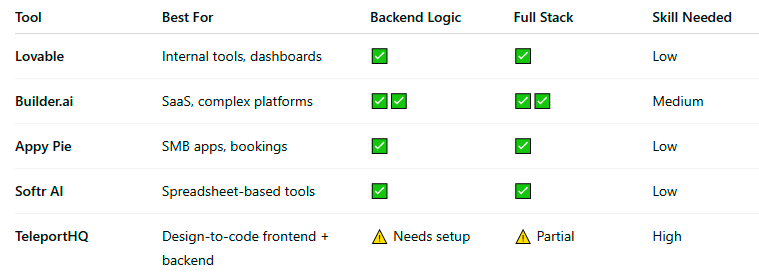
Conclusion
These aren’t landing page generators. These are full app creation engines—backends, user flows, databases, and integrations included.
They allow:
- Founders to test ideas fast.
- Agencies to deliver client apps in days
- Developers to offload boilerplate setup.
- Ops teams to build internal tools without IT bottlenecks
🚀 You don’t need a dev team. You need a prompt.
FAQs
Q1: What is an AI app builder?
A1: An AI app builder is a tool that uses artificial intelligence to automatically generate web or mobile applications from natural language prompts. These platforms handle front-end design, backend logic, databases, and integrations, allowing users to build apps without writing code.
Q2: Can AI app builders really create full-stack applications?
A2: Yes. Advanced AI app builders like Lovable, Builder.ai, and Softr AI generate both the front end (user interface) and back end (logic, data, and automation). Some also support integrations with Stripe, Supabase, Airtable, APIs, and user authentication systems.
Q3: Who should use AI app builders?
A3: AI app builders are ideal for:
Founders launching SaaS products
Agencies delivering custom client solutions
Developers looking to accelerate projects
Operations teams creating internal tools without waiting for IT support
Q4: What are the limitations of AI app builders?
A4: While powerful, AI app builders may have limitations in:
Deep backend customisation
Complex multi-app workflows
Long-term scalability in some platforms
For high-stakes enterprise-grade systems, human developer oversight is still recommended.
Q5: Are AI app builders secure and scalable?
A5: Most reputable platforms offer role-based access control, SSL, data encryption, and cloud hosting on secure infrastructure. Scalability varies—Builder.ai, for example, supports high-growth startups, while others like Appy Pie are more suited to MVPs or SMB use cases.
Q6: How do I choose the best AI app builder for my needs?
A6: Consider:
Complexity of your app (simple CRM vs. full SaaS)
Required integrations (e.g., payment, database, APIs)
Your technical comfort level
Whether you need a fast MVP or a scalable product
Use the comparison table in the article to match tools to your requirements.
Q7: Can I connect AI-built apps to external services like Stripe or Airtable?
A7: Yes. Most tools in this list support integrations with external services:
Softr AI and Lovable integrate with Airtable
Builder.ai and Appy Pie support Stripe, PayPal, and custom APIs
TeleportHQ allows API hooks during deployment
Other Articles
Environmental Sustainability for Small Business: 7 Key Steps
How to Build a Sustainable Business Strategy That Lasts
How to Think Like a Publisher and Turn Content Into a Scalable Growth Engine
